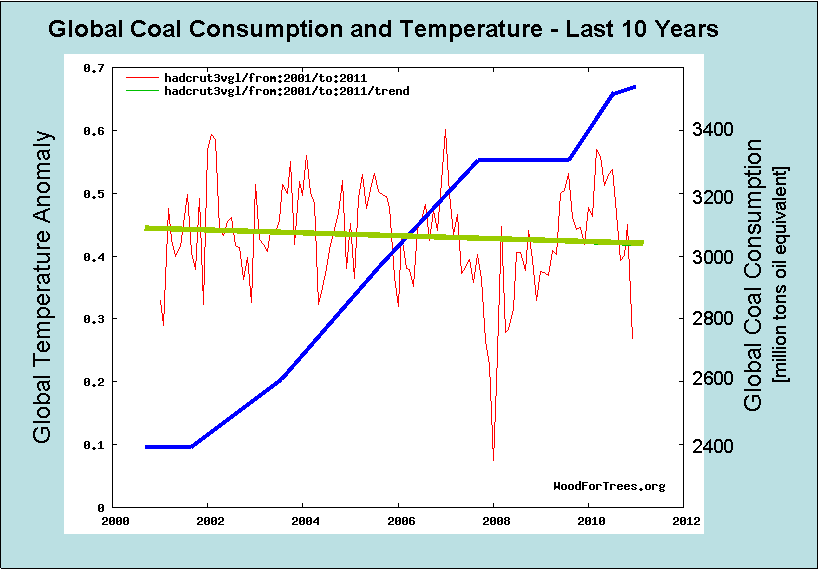A recently released BP report here shows that global coal consumption has risen over the last 10 years by almost 50%. So wouldn’t you think that all those millions of tons of emitted CO2 (food for plants) as a result would drive the global temperatures up? Have temperatures risen along with all that extra coal burning?
No they haven’t. In fact they’ve dropped slightly over the same period. So go figure!
In the above chart the blue line shows global coal consumption, data taken here, Review of World Energy. According to the report, India and China alone are responsible for 90% of the world’s coal consumption increase, while renewable energy in the 2 countries plays nary a role. According to BP figures, global CO2 emissions rose 5.8% in the year 2010.
The International Energy Agency (IEA) says that China will add a whopping 600 gigawatts of coal power plant capacity by the year 2035, equivalent to the current capacity of the USA, EU and Japan – combined! So as China adds one coal power plant each week, Europe and the USA are lucky to get a single one approved during an entire year.
Demand for coal is not about to change directions any time soon. The IEA estimates that the global population will climb to 8.5 billion people by the year 2035. That means a huge growth in demand for power. Already today the sad truth is that 20% of the global population still has no access to electricity. Forcing the prices up with CO2 emission trading schemes and carbon taxes will only make the situation worse for the very poor.
But now that we know burning coal has hardly a noticeable impact on temperature and climate (zero-correlation), it’s high time to double our efforts in producing more coal so that the world’s demand can be satisfied so that bitter poverty may be alleviated once and for all.






Many thanks for posting this. It really ought to have a wider audience.
Until the mid Seventies, climate alarmists (including a few who are prominent warmists today) believed that the burning of coal was bringing about GLOBAL COOLING by the effect of soot and aerosols which it put into the atmosphere. The CIA endorsed this view in 1974, following some cooling which included the total loss of the 1972 Russian, Autumn-sown wheat crop to intense frost. I remember that well because I was in the grain trade at the time but I didn’t know about the CIA report which became public relatively recently. It stated that there was a “scientific consensus” and that a reliable model of climate prediction had been developed. Failing human intervention, all of European Russia, Canada and Northern China could confidently be expected to be covered with hundreds of feet of permanent ice and snow. A copy of the report is in the British Library.
As I wrote yesterday, Greenpeace in Europe fights coal where they can and has just managed to make a Dutch court stop the construction of a half finished coal plant by RWE.
http://www.welt.de/print/welt_kompakt/print_wirtschaft/article13563999/Friesisches-Fiasko.html
Die Welt lets Greenpeace spout their message – “every new coal power plant cements a wrong energy policy” (wrong for Greenpeace, who sell renewable energy electricity for very high tariffs in Germany via their subsidiary Greenpeace Energy) – but the journalist fails to point out that it’s all pretty meaningless to stop the construction here while China continues to build coal plants in breathtaking speed.
China must fertilize rice production to feed their growing population. CO2 and power at the same time. What a deal! Every 7 ppm increase in CO2 increases the rice crop by 1%.
CO2 by itself is NOT A GREENHOUSE GAS, It does trap water though which is a greenhouse gas.
Burning coal releases Sulphur which is a greenhouse COOLING gas.
Sulphur is accused of causing acid rain and European regulators limit Sulphur emissions.
China does not.
Perhaps we should follow China’s example to help cool the planet.
Davo, maybe you have a problem with your writing or you have no technical knowledge. CO2 (carbon dioxide) does not trap water but it is slightly soluble in water. Some 50% of emissions are absorbed by oceans to be taken up by algaes, coral pollips, moluscs, fish etc. Sulfur (S) is not a gas. It is an element in the same family on the periodic table as oxygen and selenium. Sulfur is not soluble in water but the oxide SO2 (sulfur dixide) is highly soluble
[…] liked the article titled “Global Coal Consumption Jumps almost 50% – Yet Global Temps Drop!” Pierre gives this summary: But now that we know burning coal has hardly a noticeable impact on […]